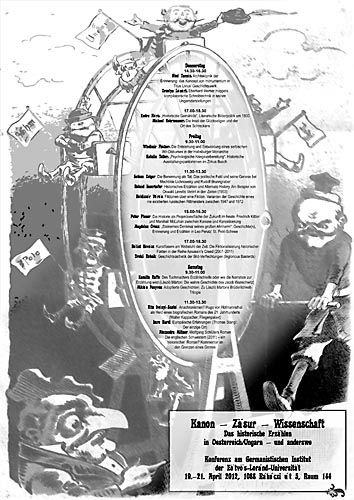 Boldizsár Vörös, senior research fellow at the HAS Institute of History, Research Centre for the Humanities gave a lecture entitled Fiktionen über eine Fiktion. Varianten der Geschichte eines nie existierten russischen Rittmeisters zwischen 1947 und 1972 on April 20, 2012 at the international conference entitled Kanon – Zäsur – Wissenschaft. Das historische Erzählen in Oesterreich/Ungarn – und anderswo organized by the Institute of Germanistics, Eötvös Loránd University, supported by Action Austria–Hungary foundation.
Boldizsár Vörös, senior research fellow at the HAS Institute of History, Research Centre for the Humanities gave a lecture entitled Fiktionen über eine Fiktion. Varianten der Geschichte eines nie existierten russischen Rittmeisters zwischen 1947 und 1972 on April 20, 2012 at the international conference entitled Kanon – Zäsur – Wissenschaft. Das historische Erzählen in Oesterreich/Ungarn – und anderswo organized by the Institute of Germanistics, Eötvös Loránd University, supported by Action Austria–Hungary foundation.
The lecturer introduced the fiction of a few Russian soldiers who in fact never existed, invented by novelist Béla Illés: Captain Gusev and his companions. The literary adaptation was carefully analyzed in Béla Illés’ work The Gusev Case. Among other things Boldizsár Vörös talked about the fact that the Gusev case, in connection with the events of Hungarian history between 1945 and 1995, pointing remarkably beyond itself in a more general context, illustrates certain truths, namely that the utilization of multiple assets, together with producing a forgery of political propaganda and distributing fictitious statements can facilitate the validation of fiction and therefore make the action effective. The way of fitting the appreciations of fictitious figures into the “invented traditions” (a definition by Eric Hobsbawm) of the 20th century was also explained by the lecturer.
Furthermore, Vörös emphasized that these examinations, also pointing beyond themselves, signify in a more general context, how unique connection possibilities can be created, transforming in time, by historical (the Gusev case) and literary fiction (the work entitled The Gusev Case by Béla Illés), and how the micro-philology method can be utilized in the analysis of literary creations used by political propaganda, contributing to the exploration of the methods of manipulation.


